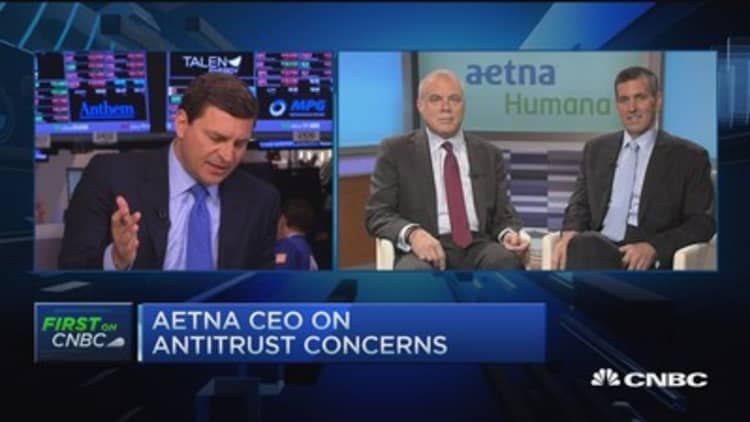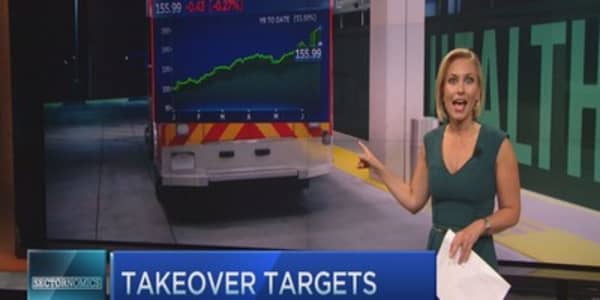
Friday's $37 billion merger of health insurance giants Humana and Aetna is just the latest move in a surge of deal-making likely to reduce the number of big U.S. health insurers to three from five. This move will likely set off a range of smaller deals as well, as shareholders cash in and customers face the prospect of less competition in key markets like Medicare Advantage and individual coverage under Obamacare.
Aetna paid a 23 percent premium to acquire Louisville-based Humana, the smallest of the Big Five. The deal followed a $6.8 billion merger on Thursday between smaller insurers Health Net and Centene and comes after Cigna and Anthem have acknowledged talking about a merger that could value the combined company at as much as $85 billion. Analysts think industry leader UnitedHealth Group could be on the prowl by next year for targets, including Molina Healthcare or Well Care Health Plans, strong niche players in Medicare and Medicaid markets.
The deals will boost acquirers' profits sharply, Leerink analyst Ana Gupte said. She estimates that Anthem would get $1.6 billion in annual synergies by 2018 from buying Cigna, and Aetna could get $1.25 billion in 2018 savings from merging with Humana. Even after debt payments that could reach $1.3 billion a year on Anthem/Cigna, the surviving company would make a profit of $19.28 a share that year, 36 percent higher than existing estimates for Anthem of $14.15. Profits next year will be 11 percent higher if that merger happens, as cost-cutting gets under way, she estimates.
Read MoreHealth-care takeover targets
"The Big Five will be a Big Three," said Gupte, who estimated public companies led by Anthem/Cigna, Aetna/Humana and United would command about a third of the U.S. health-care market, with regional players and government programs covering most of the rest.
At $230 a share in cash and stock, Aetna paid about a 29 percent premium over Humana's stock price in late May, before talks began. Health insurance stocks were also bolstered by the Supreme Court's late June ruling upholding insurance subsidies under Obamacare.
The deal-making promises big impacts on consumers, health-care providers and perhaps even the Affordable Care Act, experts said.
About a third of the synergies Gupte sees in the prospective Anthem/Cigna merger will come from reducing medical spending, which most often means cutting payments to doctors and hospitals for services they will be providing anyway. That could lead to another wave of deal-making, as hospitals and doctors seek to make themselves big enough to bargain against more concentrated insurers, said Les Funtleyder, portfolio manager at E Squared Capital Management in New York.
Read MoreObamacare a windfall for insurers: Ex-Obama advisor
Already, HCA, the nation's largest hospital chain, has merged with Dallas urgent-care center operator CareNow and medical software company PatientKeeper in the last 18 months after buying 11 hospitals since 2011. Tenet Healthcare, the Dallas-based hospital chain, merged with Vanguard Health Systems in 2013. HCA said at a January 2015 investor conference that it's looking to buy doctors' practices and outpatient care centers, consistent with a trend toward moving care into lower cost settings.
Ripple effects for consumers
Analysts say the deals are about making insurers big enough to compete profitably on the online health insurance exchanges set up under the ACA by Obamacare. Insurers had to base their prices for the 2013–14 open enrollment period for policies sold on Obamacare's state and federal exchanges based on very little information about what claims previously uninsured clients might file. Even 2014–15 prices, which rose only about 2 percent, were based on limited first-year claims data, said Larry Levitt, senior vice president at the Kaiser Family Foundation.
Read MoreA tale of two Obamacare price changes
Another complication is that the act requires insurers to spend 80 percent to 85 percent of premium dollars on medical claims, depending on the plan, according to the Congressional Research Service. That pressures them to get economies of scale on the administrative costs that eat up 16 percent of Anthem's revenue, versus 18 percent at Aetna, helping pressure the companies into making deals.
Many insurers have had trouble initially making money on their Obamacare individual-client business, though the expansion of Medicaid has been a boon to all of the Big Five. The individual health insurance and government-backed insurance markets in general are less profitable than privately sponsored group plans.
"We look at 2014, 2015 and 2016 as version 1.0 of the [ACA] marketplace," Cigna CEO David Cordani told analysts on an April conference call. He said an independent Cigna would lose less this year than last on policies sold through Obamacare, and still less in 2016.
What's the magic number?
The question is whether the mergers will cut into competition among insurers, with the prospect that regulators will make some acquirers sell off certain books of business before closing the deal, Goldman Sachs analyst Matthew Borsch said in a June 30 report. Aetna and Humana could have to sell off 18 percent of their combined individual policyholders' business, 16 percent of small-group commercial business and 13 percent of their Medicare Advantage business to avoid running afoul of antitrust guidelines, Borsch estimated.
The level of competition in health insurance varies sharply depending on region and on the product being sold, Levitt said. Because Anthem and Cigna have less overlap in their businesses, Goldman estimated that it wouldn't have to sell off any individual-policy business and only 1 percent of their combined Medicare Advantage business.
"There is no magic number of insurers to drive adequate choice and competition, but you generally want three competing insurers in a market to drive competition," Levitt said.
But there already isn't a lot of margin for error in a fairly concentrated market for individual insurance, Funtleyder said.
"Most states are dominated now by a Blue Cross plan (owned by Anthem) and one of two others," he said. "Ultimately, we'll have three or four of everything.''
—By Tim Mullaney, special to CNBC.com




